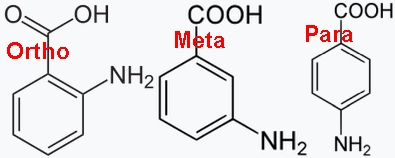Had a WTP? etymological moment in the middle of the night - woke up screaming and all. El Blobbo has used the word paraphernalia - in the sense of baggage, stuff, accoutrements, shite - many* times in the 2 million words that is the corpus. Paraphernalia is a very long word and, for the first few times I used it, the red ragged spellinge errur underlining would appear because I omitted the second R. This is the first time I've ever knowingly written accoutrements which in my mind are exclusively the appurtenances of knights-in-armour - greaves, mace, hauberk, cuirass etc. And, recursively, that's a blobofirst for appurtenances! Should stick with "stuff" - simpler.
The prefix Para- means 'beyond' which I remember from internalizing the, now old-fashioned, names for chemical isomers. Take aminobenzoic acid, there are three isomers depending on how close the amino group is to the carboxyl:
Para-amino-benzoic acid PABA is probably the most familiar. It effectively absorbs UV-light and was used extensively in sun-screens until They decided that its allergenic [and clothes-staining] potential out-weighed its anti-melanoma efficacy. PABA is "natural" and created in reasonably large quantities by the intestinal flora. Ortho-amino-benzoic acid [Anthranilic acid] is an intermediate in the production of quaaludes, so don't take any of that through US customs and immigration. The other one MABA 3-Aminobenzoic acid is really dull by comparison. Preferred IUPAC names are 2-Aminobenzoic acid [ortho]; 3-Aminobenzoic acid [meta]; and 4-Aminobenzoic acid [para] or H-2Abz-OH etc., if you're in a tearing hurry.
Mais revenons nous à nos phernalia! Turns out that paraphernalia's original meaning was the independent real and personal property of a married woman which could be willed or given away at her sole discretion. That was back in the day when women were transferred as a chattel at marriage from one bloke [father] to another [husband] and came with a dowry or bride-price. The remains of this sorry state of affairs is the convention that bride's father pays for the wedding and its reception. Indeed etymologically phernalia comes from the Greek φερνή phernē meaning dowry. So paraphernalia was the stuff beyond or in addition to the dowry. That specific legal meaning slumped over the years to mean stuff with a hint of clutter. I'm glad we've sorted that out!
* Blob-usage of the word in question:
- Art historians love fossicking through this sort of stuff to identify sitters from the heraldic paraphernalia that clutters the corners of the picture.
- In among the usual paraphernalia that you get in such places, there was a python in permanent siesta mode . . .
- I was born less than 10 years after the end of WWII, so the paraphernalia of that conflict were still 'in the air' . . .
- at the family home looking at piles of papers, plates, pots, pot-plants, and paraphernalia.
- my assigned bedroom was filled with catholic paraphernalia, including an Infant of Prague on the mantle piece
- purchase a red enamel tea-pot and some other kitchen paraphernalia
- . . . seen through a gale of advertisements for gripe-water, baby-buggies, mobiles, pop-up books and all the paraphernalia that modern babies require/acquire.
- You never really wanted to store that information and it gets displaced by the next hot girl's telephone number; the location of the car-keys; or how to spell paraphernalia depending on your age and priorities.

No comments:
Post a Comment